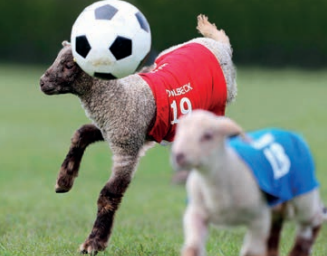July 2021
Tom Clendon explains why you can’t compare lambs with footballers!
A student’s question
I know that lambs born on a farm have a zero cost to the farmer and are required to be measured at fair value. Well, why can’t Premier League football clubs do the same with footballers that come through their academy?
After all, I understand that the players bought from other clubs are recognised as intangible assets.
Tom’s reply
An interesting question! I love the desire to understand the principles and to apply them to real life situations. So here goes…
Farm animals as assets!
You are right that IAS 41 Agriculture is explicit in requiring animals such as lambs that are born on the farm to be recognised as assets and measured at fair value. The gain is then recognised in the profit and loss account – after all, breeding is an operating activity for a farmer.
This treatment ensures a faithful representation of a farmer’s statement of financial position. If the lambs were included at their zero cost they would be invisible and therefore the accounts would be incomplete.
A fair value for farm animals can be easily determined by observing their market value.
This is because such animals are fungible in their nature; i.e. a one-month-old merino sheep weighing a certain weight will be worth the same as the next one, and are regularly bought and sold.
Footballers as assets!
It is also true that when a Premier League football club buys a player’s registration the club recognises an intangible asset in accordance with IAS 38 Intangible Assets. After all, there has been a transaction, a sum of money (the transfer fee) has been paid and the buying club controls the player’s registration, which should bring future economic benefit.
By contrast, however, academy players that become professional footballers are not underpinned by a single transaction. There is no reliable measure of either their cost or value because they are not bought and do not have value that can be reliably measured. There is after all only one Marcus Rashford and there was only one Steven Gerrard.
The same reasoning applies for the accounting for both brand names and goodwill.
Yes, if a business buys them, then they are recognised as intangible assets. But if the brand or goodwill comes about from self-promotion they are prohibited by IAS 38 Intangible Assets from being recognised as an asset.
One final thought
It is a fair criticism to observe that the statements of financial position of football clubs are incomplete in that they fail to recognise as assets their academy players that go on to play for the first team.
• Tom Clendon is an ACCA lecturer and podcaster who teaches SBR online – see www.tomclendon.co.uk




